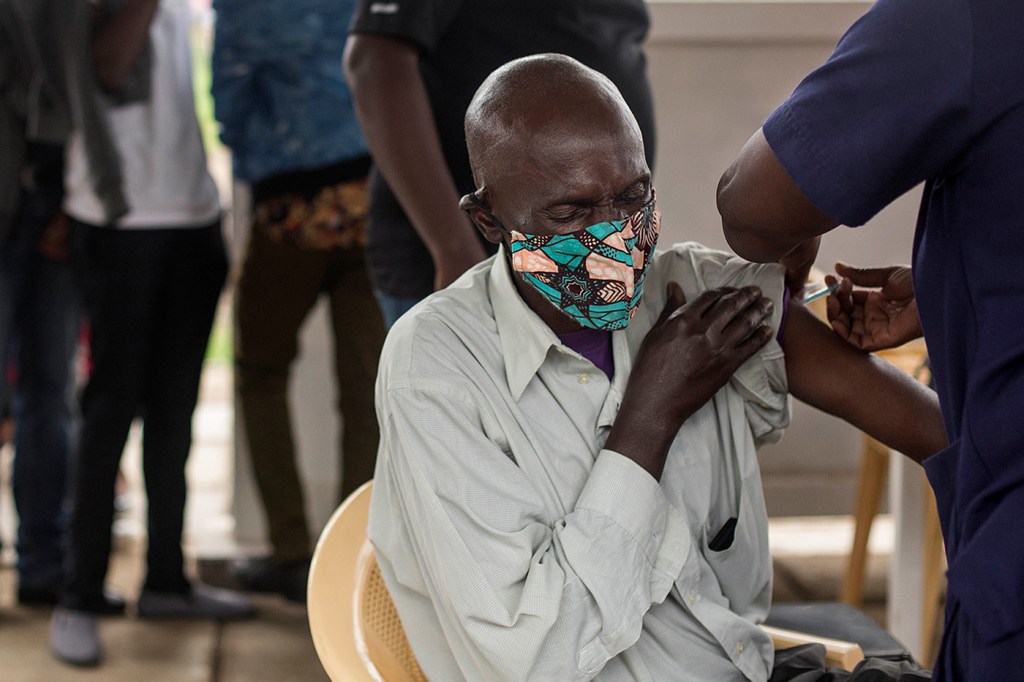Why has Africa suffered fewer COVID-19 deaths than predicted?

Africa has accounted for a relatively small number of deaths during the COVID-19 pandemic. Richard Wamai, a Northeastern associate professor of cultures, societies, and global studies, wanted to know why the official numbers differed so widely with projections from the early days of the pandemic that Africa would be especially vulnerable to the disease.
“The predictions of mass COVID casualties were based on a misunderstanding of the continent,” says Wamai, who has co-authored a new paper that details why the gloomy predictions have largely gone unrealized. “There are lessons we can learn about how the continent has handled the pandemic, or how the pandemic has manifested in the continent.”

Richard Wamai, associate professor of cultures, societies, and global studies at Northeastern. Photo by Matthew Modoono/Northeastern University
Not only has Africa utilized unrecognized strengths to help fend off COVID-19, says Wamai, but it also offers clues that can be applied against future pandemics. Africa represents 12.5 percent of the global population, but it accounted for just 4 percent of the 3.4 million deaths that had been reported around the world as of May 18.
Predictions that Africa would suffer catastrophically were based on beliefs that the continent would be vulnerable to poverty, unsanitary living conditions, and weak healthcare systems. Instead, says Wamai, national and local governments already had healthcare systems in place to deal with HIV/AIDS, Ebola, and other epidemics. By April 2020, a large majority of African countries had enacted at least five “stringent” public health and social measures in response to the pandemic, according to The Lancet.
“The continent has a long history of experience with infectious diseases,” Wamai says in an interview from his native Kenya. “We didn’t have to scramble to organize hospitals that have cases. We had a community health volunteer system in place.”

Neil Maniar, professor of the practice and director of the Master of Public Health program at Northeastern. Photo by Matthew Modoono/Northeastern University
In Kenya, notes Wamai, he has undergone screening at the airport and has received official alerts on his phone about COVID-19—government measures that he has not experienced in the U.S.
“We don’t have to have large economic resources to handle pandemics,” says Wamai, whose co-authors include Jason Hirsch, a recent Northeastern graduate in behavioral neuroscience. “We still have very large and strong health programs on the continent, largely because of all of these historic experiences with infectious diseases.”
Wamai acknowledges that cases have been undercounted in Africa, where fewer tests for SARS-CoV-2, the coronavirus that causes COVID-19, have been conducted than on any continent other than Antarctica. There is a need for more hospitals in Africa, he says.
But local systems for reporting deaths in Africa make it difficult to hide COVID-19 casualties, Wamai adds. And some of the excess deaths of the past year can be attributed not to the disease, but to lockdown measures that cut off access to medical care for other illnesses, as well as other necessities.
Wamai notes other factors in Africa’s favor, including a preponderance of countries where people spend more time outside than on other continents. Africa also features the youngest population among global regions, with a median age of 19.7 years that is roughly half as young as that of the United States (38.5) and the United Kingdom (40.5), which have been hit hard by the pandemic. And people in Africa suffer a relatively low burden of noncommunicable diseases, such as cardiovascular disease, respiratory disease, and cancer, which increase the risk of dying from COVID-19.
Wamai also cites research showing that exposure of people in Africa to the Bacillus Calmette-Guérin vaccination, which is administered against tuberculosis, could make them less vulnerable to COVID-19.
Wamai’s investigation of African outcomes shows the importance of learning from the pandemic, says Neil Maniar, professor of the practice and director of the Master of Public Health program at Northeastern. Maniar says that Wamai’s study raises all kinds of relevant questions, such as: How effective have lockdowns been in mitigating the spread of COVID-19—and have the lockdowns themselves accentuated income inequalities that contributed to the toll of the pandemic?
“As we prepare for future pandemics, and we know that there will be future pandemics, this is really a call to action for everyone to think about what we need to do in terms of having a coordinated global surveillance system,” Maniar says. “This pandemic has revealed the consequences of having an underfunded, under-resourced public health infrastructure—and that goes for everywhere in the world. Because it’s hard to play catch-up when you’re in the midst of a public health crisis. The time to invest is before you ever get into a crisis.”
For media inquiries, please contact Marirose Sartoretto at m.sartoretto@northeastern.edu or 617-373-5718.






